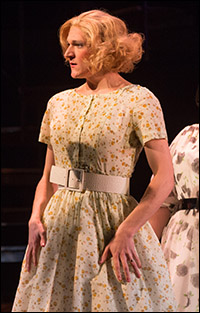
*
Gabriel Ebert will soon be known for the unique costumes he wears when performing on Broadway. While starring in Matilda the Musical as the title character's TV-loving father who works as a used car salesman, Ebert donned a yellow and green plaid suit, alligator print shoes and lengthy sideburns. In Casa Valentina, he quickly sheds his conservative chinos and t-shirt for a soft yellow dress and blonde wig when his character Jonathon exhibits his inner-girl Miranda while away for a weekend in the Catskills.
Ebert, who took home a Tony Award for his portrayal of Matilda's father, has also performed in 4000 Miles and Brief Encounter. In Casa Valentina, he plays Jonathon/Miranda, a secret cross-dresser and newcomer to Casa Valentina. Jonathon feels apprehensive about exploring "the girl within," but is soon drawn into the community of support and friendship that the residents of the resort share.
Ebert talked with Playbill.com about the attraction of the show and the freedom that came with dressing as a woman.
Casa Valentina is a very different kind of production than Matilda. How did you get involved with the play?
Gabriel Ebert: I came across the play doing a reading back in June or July, and I began to have the feeling that you really hope to have as an actor, where you're both intrigued and terrified and you think, "Oh, I don't know if I'm capable of this," but you know that you are, and you're going to push yourself to do it. And so I think the feeling that I [had] approaching rehearsals every day for this play, albeit slightly gallop apace with my heart, is the kind of thing that you live for as an actor.
 |
||
| Ebert in Casa Valentina. |
||
| photo by Joan Marcus |
GE: I think the thing that's unique about this play — recently we've seen a lot of men dressing as women on Broadway, but you haven't seen this kind of character within that. There's a sort of raw honesty and a vulnerability to these men that I think often isn't portrayed in the things that are based on drag queens, because there's a more performative element to drag queens; whereas these men are not actors and not performers. It's an incredibly deep desire for them to dress as women, and it doesn't have to do with their sexuality. It's a sexual practice for some of them, but it doesn't have to do with sexuality as much as a sort of revealing of the inner self. I don't think characters like this have been seen on a stage — at least not by me or anyone I know.
Casa Valentina is set in 1962, and gender roles have changed so much since then. The show provides some insight into the culture of masculinity that was so wide-spread during that time in our history.
GE: A lot of these men are less comfortable dressed as men than they are as women. The male archetype of the strong provider, hunter-gatherer type, was much more prevalent in the late 50s, early 60s than it even is today. I think men are allowed to be many more things today than they were then; it can still be constricted or crippling, and there's something about dressing as a woman for these men that allows them to sort of release those shackles for a small time.
But it comes with a price, and I think Harvey's done a great job of writing that freedom but also writing that price that these men have to pay to get that freedom. And I think that there are ways in which that's different today, but I still think that when you see a man, you expect certain things of him, and when you see a man dressed as a woman, you expect certain things of him or you assume certain things about him.
How have you adapted to wearing heels? Has it been a challenge?
GE: We've got to give you gals credit! It's tough.
(Carey Purcell is the Features Editor of Playbill.com. Her work appears in the news, feature and video sections of Playbill.com. Follow her on Twitter @PlaybillCarey.)














Matthew-Murphy.jpg)






